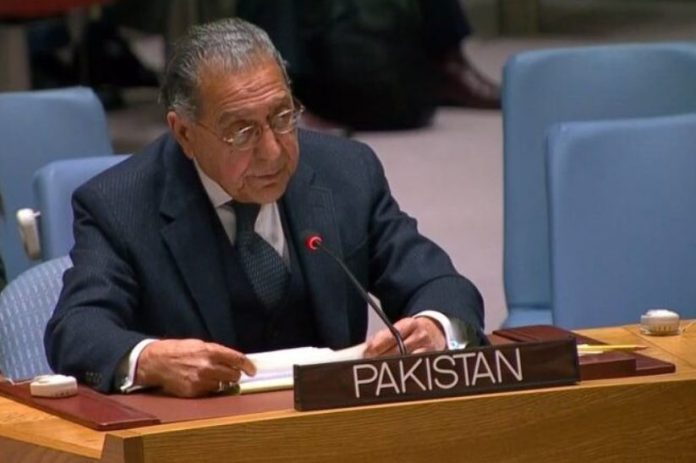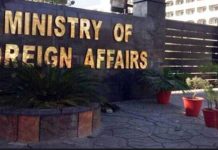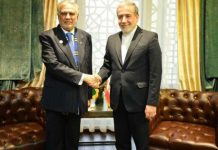UNITED NATIONS, Pakistan is at the forefront of counter-terrorism efforts, fighting not only Da’esh, but also Tehrik-e Taliban Pakistan (TTP) and Majeed Brigade operating from safe havens in Afghanistan, Ambassador Munir Akram told the UN Security Council, as he urged the 15-member body to act against these elements.
“This threat of Daesh, TTP and Majeed Brigade is a threat not only to Afghanistan and Pakistan but to the entire region and beyond,” the Pakistan envoy said in a debate on the 20th biannual report of the Secretary-General on the threat posed by Da’esh to international peace and security.
“We must sincerely address the terrorist threats from Afghanistan,” he added.
At the same time, Ambassador Akram said the international community has failed to address State terrorism, including the use of State power to suppress legitimate struggles for self-determination or to continue foreign occupation.
“There must be accountability for the violation of fundamental human rights, especially the right to self-determination and in situations of foreign occupation,” he said, referring to the suppression of the freedom struggles of Kashmiri and Palestinian people.
Opening the debate, UN Under-Secretary-General Vladimir Voronkov, who heads of the Office of Counter-Terrorism, said that Da’esh remains a serious global security threat despite years of sustained efforts to dismantle its operations.
“Terrorism remains a significant and evolving threat to global peace and security, one that no State can confront in isolation,” he said.
In his remarks, the Pakistani envoy also said that terrorist attacks have increased globally, especially across the Middle East, Africa and in and from Afghanistan.
“While Al-Qaeda ‘core’ was decimated in Afghanistan, largely due to Pakistan’s efforts, I may mention, several of Al-Qaeda’s subsidiaries have emerged elsewhere, including in North Africa and Sub-Saharan Africa,” he said, pointing out that D’aesh was suppressed in Syria and Iraq, but the franchises have also emerged in Afghanistan and in the Sahel.
As such, Ambassador Akram stressed that the international community must address the terrorist threat together, through a comprehensive, coordinated and principled strategy based upon the Global Counter Terrorism Strategy (GCTS) adopted by the General Assembly.
Noting that there are all over two dozen terrorist groups operating inside Afghanistan, which is also the “main hub for ISIL-K’s recruitment and facilitation”, he said that the country is the main hub of recruitment of Daesh. “We reject any imputation that there is any such recruitment in Pakistan.”
Ambassador Akram also called for addressing the root causes of terrorism that, including poverty, injustice and prolonged unresolved conflicts, foreign occupation and denial of the right to self-determination to peoples under colonial and foreign domination and alien rule, such as in the occupied territories of Palestine and Jammu and Kashmir.
“Without addressing the root causes, we can hope for little success if our focus remains restricted to the consequences of such policies,” he said.
“There must be accountability for the violation of fundamental human rights, especially the right to self-determination and in situations of foreign occupation.”
In this context, the Pakistani envoy stressed the need for changes in the UN’s counter terrorism architecture and sanctions regimes to ensure that they are adequately equipped to respond to the current challenges and represent a fair, just and comprehensive mechanism.
“We must address the new cyber tools of terrorism, including the dark web and cryptocurrencies which are being utilized increasingly for radicalization campaigns, incitement to violence, terror financing, propaganda and disinformation through the social media.”
“To comprehensively defeat terrorism,” he added, “we must address the new and emerging forms of terrorism including violent acts by white supremacists, far-right extremists, violent nationalist, fascist, xenophobic, Islamophobic and anti-Muslim groups, and similar ideologies in various parts of the world.
Counter-terrorism policies have so far singled out only one religion — Islam — but they must address the negative impact of stigmatizing Muslims and fanning the flames of Islamophobia, Ambassador Akram pointed out.
Natalia Gherman, Executive Director of the Counter-Terrorism Committee Executive Directorate (CTED), said that Da’esh remains agile, taking advantage of ongoing conflicts and regions experiencing growing instability.
This comes amid shifting global counter-terrorism efforts, including the conclusion of the Investigative Team to Promote Accountability for Crimes Committed by Da’esh (UNITAD) mandate, which leaves behind a significant judicial support legacy for future accountability processes.
“In the Sahel and the Lake Chad Basin, Da’esh’s decentralised operations continue to proliferate as regional cooperation declines,” Ms. Gherman warned.
















